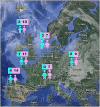Design and effectiveness of an online group logotherapy intervention on the mental health of Iranian international students in European countries during the COVID-19 pandemic
- PMID: 38449504
- PMCID: PMC10915759
- DOI: 10.3389/fpsyt.2024.1323774
Design and effectiveness of an online group logotherapy intervention on the mental health of Iranian international students in European countries during the COVID-19 pandemic
Abstract
Introduction: The secondary impact of the COVID-19 pandemic, leading to widespread psychological challenges, significantly strained international students' mental health. The present work sought to design and assess the efficacy of an Online Group Logotherapy Protocol, an existential psychology approach developed by Viktor Frankl, to reduce anxiety and depression levels among Iranian international students who were migrants/refugees in different European countries during the pandemic.
Methods: The study recruited 70 students (58 females and 12 males, age range 20-35, 6 EU countries) experiencing moderate levels of anxiety and depression as measured by the Beck Anxiety (BAI) and Depression (BDI) Inventories at pre-test. Half the participants received a short-term closed group intervention comprising 6 online sessions / 90 min of logotherapy. The control group received 6 sessions without specific psychological treatment.
Results: The designed logotherapy sessions consisted of 1. Fundamentals of logotherapy, 2. Existential concerns, 3. Introspection, 4. Self-awareness and growth, 5. Empowering and facing challenges, 6. Meaning of life and conclusions. Five logotherapy techniques were used: Socratic Dialog, Modification of Attitude, Paradoxical Intention, Dereflection, and Logodrama. After the sessions, the post-test MANCOVA analysis showed a more potent effect of logotherapy reducing depression and anxiety than that elicited without intervention. The Eta coefficient suggests that the observed difference explains the effect of logotherapy with a strong power of 89%.
Conclusion: These findings unveil (1) the benefits of online group sessions despite the geographical distance and (2) the relevance of logotherapy effectively reducing depression and anxiety in such complex scenarios where psychological resources and cultural competencies are limited.
Keywords: COVID-19 pandemic; anxiety disorders; depressive disorder; group psychotherapy; international students; logotherapy; migration.
Copyright © 2024 Rahgozar and Giménez-Llort.
Conflict of interest statement
The authors declare that the research was conducted in the absence of any commercial or financial relationships that could be construed as a potential conflict of interest. The reviewer JL declared a shared affiliation with the authors to the handling editor at the time of review.
Figures



References
-
- Necef I. International students’ homesickness and depression associations with mood regulation expectancies, acculturation and attachment. Fullerton: California State University; (2014).
LinkOut - more resources
Full Text Sources

